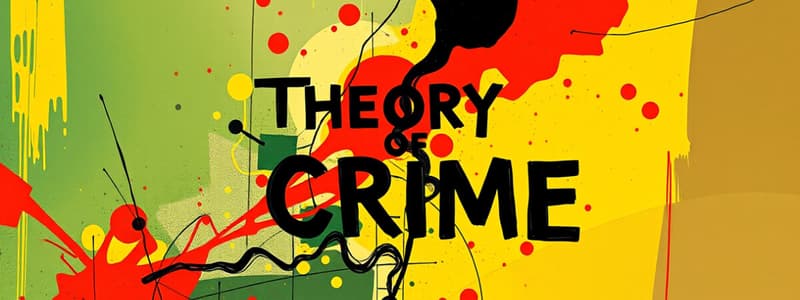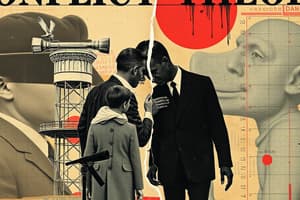Podcast
Questions and Answers
What is criminology the study of?
What is criminology the study of?
crime and criminal justice
Which of the following are schools of criminology? (Select all that apply)
Which of the following are schools of criminology? (Select all that apply)
- Critical (correct)
- Classical (correct)
- Modern
- Positivist (correct)
What theory of crime dominated early Western history?
What theory of crime dominated early Western history?
the demonic perspective
What concept does classical criminology build on?
What concept does classical criminology build on?
Who were the two main classical theorists?
Who were the two main classical theorists?
What does positivist criminology focus on?
What does positivist criminology focus on?
What does critical criminology concern itself with?
What does critical criminology concern itself with?
What type of crimes did Richard Quinney argue emerged?
What type of crimes did Richard Quinney argue emerged?
Critical race theory assumes that racism is an ordinary part of American society.
Critical race theory assumes that racism is an ordinary part of American society.
What term refers to those with a precarious financial existence?
What term refers to those with a precarious financial existence?
Crime often refers to _______ rather than _______.
Crime often refers to _______ rather than _______.
Which of the following are included in crimes of domination? (Select all that apply)
Which of the following are included in crimes of domination? (Select all that apply)
What do state-corporate crimes involve?
What do state-corporate crimes involve?
Utilitarianism of Cesare Beccaria falls under classical criminology.
Utilitarianism of Cesare Beccaria falls under classical criminology.
What do political action committees (PACs) do?
What do political action committees (PACs) do?
What is stratification?
What is stratification?
Class mobility describes the movement across socio-economic classes.
Class mobility describes the movement across socio-economic classes.
What is the primary factor involved in motivations and opportunities to commit crime?
What is the primary factor involved in motivations and opportunities to commit crime?
Flashcards are hidden until you start studying
Study Notes
Criminology Overview
- Criminology is shaped by three revolutions: reason, science, and reflexivity.
- Three schools of criminology include classical, positivist, and critical.
- Early Western theories viewed crime through the demonic perspective, defining it as a sinful act against God.
Classical Criminology
- Emerged during the Enlightenment period (mid 1700s - early 1800s); rooted in the concept of the social contract.
- Key theorists: Cesare Beccaria and Jeremy Bentham.
- Beccaria's utilitarianism is associated with classical criminology's emphasis on rational decision-making in crime.
Positivist Criminology
- Focuses on behavior and treatment of individuals, arguing that understanding behavior should align with individual circumstances.
- Influenced by early thinkers such as Adolphe Quetlet, who classified crime into accidental, variable, and constant categories based on various factors.
- Emphasizes biology and social mechanics; notable figures include Cesare Lombroso, who linked biology to criminal behavior.
Critical Criminology
- Questions the intersection of biography and history, advocating for social justice.
- Critical criminology views the law as a reflection of power dynamics and often critiques mainstream criminological perspectives.
- Richard Quinney identifies two crime types: crimes of domination (systemic exploitation) and crimes of accommodation (individual offenses).
Race, Class, and Crime
- Race is shaped by physical traits, culture, and national origin; complex interplay influencing crime and societal reactions.
- Willem Bonger highlighted race and crime in critique of fascism’s impact on perceptions of racial superiority.
- Critical race theory asserts that racism is an ingrained aspect of society, necessitating deeper systemic changes for justice.
Class and Social Stratification
- Social class is defined as divisions based on status, with the capitalist society exhibiting pronounced stratification.
- Economic disparities are evident; whites possess approximately eight times the wealth of blacks.
- The working class, often seen as America's backbone, includes skilled and unskilled laborers, while the lower class faces perpetual underprivilege.
Crime Structures and Control
- Instrumental and structural models illustrate different approaches to understanding crime control in the U.S.
- Criminal law serves as a tool for maintaining capitalistic structures, as per instrumental and structural Marxism.
- The concept that crime in elite classes (crime in the suites) often goes overlooked compared to street crime (crime in the streets) highlights class bias in justice systems.
Gender and Intersectionality in Criminology
- Acknowledgment of women's roles and experiences in criminology evolved through multiple stages, including feminist perspectives on crimes affecting women more significantly.
- Intersectionality highlights how various social categories, such as gender, race, and class, intersect and affect individual experiences and societal perceptions of crime.
- Critical legal scholarship challenges prevailing ideologies and myths about race and gender in the legal system.
Social Adaptation and Crime
- Merton's modes of social adaptation include conformity, innovation, ritualism, retreatism, and rebellion, shaping responses to societal pressures.
- Class mobility reflects the ability to change socio-economic status, with significant implications for crime and justice engagement.
Influence of Capitalism on Crime
- Corporate and state crimes encompass a range of activities that can inflict harm beyond traditional definitions of crime, emphasizing the need for critical examination of power dynamics in shaping definitions and enforcement of criminality.
- Concepts of critical white studies and feminism within critical race theory illuminate the nuances of privilege and systemic issues in crime narratives.
Overall Implications
- The relationship between crime, class, and race reveals systemic inequalities that permeate the justice system.
- Continuous reflection on the nature of crime and its societal implications is essential for establishing criminology as a robust social science rather than merely an instrument of social control.
Studying That Suits You
Use AI to generate personalized quizzes and flashcards to suit your learning preferences.




